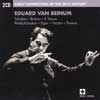Beethove Symphonies Nos 2 and 7
Beinum’s reputation for dullness is belied by several of these archive recordings
View record and artist detailsRecord and Artist Details
Composer or Director: Nikolay Rimsky-Korsakov, Johannes Brahms, Richard Strauss, Edward Elgar, Franz Schubert, (Charles Louis) Ambroise Thomas, (Carl) Otto (Ehrenfried) Nicolai
Genre:
Orchestral
Label: Great Conductors of the 20th century
Magazine Review Date: 13/2003
Media Format: CD or Download
Media Runtime: 155
Mastering:
Mono
ADD
Catalogue Number: 575941-2

Tracks:
| Composition | Artist Credit |
|---|---|
| Symphony No. 6 |
Franz Schubert, Composer
(Royal) Concertgebouw Orchestra, Amsterdam Eduard van Beinum, Conductor Franz Schubert, Composer |
| Symphony No. 2 |
Johannes Brahms, Composer
(Royal) Concertgebouw Orchestra, Amsterdam Eduard van Beinum, Conductor Johannes Brahms, Composer |
| (Die) Lustigen Weiber von Windsor, '(The) Merry Wives of Windsor', Movement: Overture |
(Carl) Otto (Ehrenfried) Nicolai, Composer
(Carl) Otto (Ehrenfried) Nicolai, Composer (Royal) Concertgebouw Orchestra, Amsterdam Eduard van Beinum, Conductor |
| Don Juan |
Richard Strauss, Composer
(Royal) Concertgebouw Orchestra, Amsterdam Eduard van Beinum, Conductor Richard Strauss, Composer |
| Scheherazade |
Nikolay Rimsky-Korsakov, Composer
(Royal) Concertgebouw Orchestra, Amsterdam Eduard van Beinum, Conductor Nikolay Rimsky-Korsakov, Composer |
| Cockaigne, 'In London Town' |
Edward Elgar, Composer
Eduard van Beinum, Conductor Edward Elgar, Composer London Philharmonic Orchestra |
| Mignon, Movement: Overture |
(Charles Louis) Ambroise Thomas, Composer
(Charles Louis) Ambroise Thomas, Composer (Royal) Concertgebouw Orchestra, Amsterdam Eduard van Beinum, Conductor |
Composer or Director: Ludwig van Beethoven
Genre:
Orchestral
Label: BBC Music Legends/IMG Artists
Magazine Review Date: 13/2003
Media Format: CD or Download
Media Runtime: 73
Mastering:
Mono
ADD
Catalogue Number: BBCL4124-2

Tracks:
| Composition | Artist Credit |
|---|---|
| Symphony No. 2 |
Ludwig van Beethoven, Composer
Eduard van Beinum, Conductor Ludwig van Beethoven, Composer Philharmonia Orchestra |
| Symphony No. 7 |
Ludwig van Beethoven, Composer
Eduard van Beinum, Conductor Ludwig van Beethoven, Composer Philharmonia Orchestra |
Author: John Warrack
The BBC record shows much how he could vary in one and the same concert (at the Festival Hall in November 1958). As Alan Sanders writes in his very informative notes to both these records, there has been a tendency ‘to dismiss his faithful, objective style of music making as being worthy but dull’. Beethoven’s Second Symphony lends support to that. Everything is in place, fair, clear and firm, but there is also a distinct over-emphasis, as if Van Beinum were compensating for some lack of real engagement with the work.
Then, with the Seventh, all his virtues come together in inspired fashion. Tempi are beautifully judged (not every conductor manages to secure a just combination of weight and pace in the Allegretto), the structure of the first movement’s Vivace is taut and powerful, with a superb build-up to the closing bars; the finale has a dynamic energy that springs from the inner nature of the music (in the Second’s finale it seemed imposed from without). This is a performance to set beside that of Klemperer, whom Van Beinum was in fact replacing.
There is again an unexpected contrast between the two symphonies on the second set. Schubert’s Sixth is oddly heavy-handed, with assertive accents and almost nervous emphases in the phrasing, at any rate until relaxation comes with the finale. Yet the performance of Brahms’s Second finds Van Beinum in his element. The opening theme becomes a motto which binds the whole work discreetly but expressively. So the opening Allegro, beautifully played, has a lyrical ease that is at the same time a closely knit structure, while in the Allegretto there is a dancing variety as Brahms plays with the theme, and the finale drives home energetically but never frenetically. It is a conductor in total sympathy with the music, in no need of demonstrating his personal skills.
Of the more virtuosic works, Van Beinum is perhaps happiest with Scheherazade, certainly in his lyrical handling of the third movement. He is certainly more at home with the gentle Romanticism of Nicolai’s Merry Wives Overture than with the frenzies of Don Juan, which, notwithstanding a fine oboe solo in the love scene, comes over rather scrappily. Cockaigne bustles along with cheerful appearances from the street band and tenderness in the nocturnal music.
These are, as with all Van Beinum’s music-making, truthful and well-wrought performances. If he is uneven, it is never through meretriciousness. Perhaps, of these recordings, only Beethoven 7 and Brahms 2 would really qualify him as, in the series’s title, one of the ‘Great Conductors of the 20th Century’. But then greatness is seldom if ever consistent; it is mediocrity that can always be relied upon to be itself.
Explore the world’s largest classical music catalogue on Apple Music Classical.
Included with an Apple Music subscription. Download now.

Gramophone Digital Club
- Digital Edition
- Digital Archive
- Reviews Database
- Events & Offers
From £9.20 / month
Subscribe
Gramophone Club
- Print Edition
- Digital Edition
- Digital Archive
- Reviews Database
- Events & Offers
From £11.45 / month
Subscribe
If you are a library, university or other organisation that would be interested in an institutional subscription to Gramophone please click here for further information.






